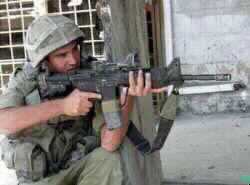HIGHLIGHTS: Hamas Leader of the Jenin Region, Abu el-Heijah, Detained||Prolonged Conflict Corrupting Jewish Culture, Says Chief Rabbi in Britain||U.S. Backs Truce Plan|| STORY: Israeli occupation forces said they had arrested a group of Israeli Arabs accused of helping a Palestinian bomber blow up a bus and Washington urged renewed efforts to revive the stalled Gaza-Bethlehem truce plan.
The arrest of seven Israeli Arabs, two of whom Israel believes chose the target of the bombing in northern Israel three weeks ago, fueled Israel's concern over the role of its Arab citizens in a 23-month-old Palestinian uprising against Israeli occupation.
Nine people were killed at the Meron Junction when the bomber blew himself up in a commuter bus filled with Jews and Arabs.
"At a certain stage they became the initiators and the executors of the attack, without pulling the trigger," Israeli police chief in the Galilee Yehuda Solomon told reporters.
Israeli occupation soldiers Monday also arrested a Hamas leader who tops Israel's list of most-wanted militants in the northern West Bank.
In Britain, chief rabbi Jonathan Sacks was quoted as saying Tuesday that Israel was adopting a stance incompatible with the deepest ideals of Judaism.
"I regard the current situation as nothing less than tragic," he told the Guardian newspaper in an interview. "It is forcing Israel into postures that are incompatible in the long run with our deepest ideals.
"There is no question that this kind of prolonged conflict, together with the absence of hope, generates hatreds and insensitivities that in the long run are corrupting to a culture."
TRUCE TEST
Citing what it called persistent intelligence warnings of Resistance attacks, Israeli forces resumed raids in the West Bank at the weekend amid an apparent stalemate over how to broaden a gradual truce plan.
The so-called "Gaza-Bethlehem First" arrangement, under which Israeli forces left Bethlehem last week, is viewed as a test for a wider withdrawal and truce in the Palestinian uprising.
But Israel has not carried out a pledge to ease military closures in the Gaza Strip amid new violence there and an agreement for a withdrawal from Hebron foundered at the weekend.
State Department spokesman Richard Boucher said: "We continue to urge both sides to continue to move down that road that they started with."
Israeli Defense Minister Binyamin Ben-Eliezer denied the plan had been shelved but said Palestinian security services had not done enough to live up to their end of the deal.
"It is not dead. It lives. How can you expect a complete change in the situation in two days after a conflict running (almost) two years? I expect efforts from them," he said.
Boucher appeared to agree. "It's imperative that Palestinian security forces take full command of the positions that were recently vacated by the Israelis so that they can prevent the recurrence of violence and terror," he said.
"We've been urging both sides to remain committed to their agreement and to continue security contacts, including contacts by local commanders. Regular detailed discussions will be critical to ensuring the long-term success of this initiative and improvement in the Palestinian humanitarian situation," the spokesman told a daily briefing.
Palestinian officials have accused Israel of freezing further withdrawals from the remaining six West Bank cities it occupied in .
HAMAS ARREST & THE BAKRI CLAN
Israeli occupation soldiers in armored vehicles Monday entered the Jenin refugee camp, scene in April of the bloodiest fighting in the Palestinian uprising, and arrested Abdel Salam Abu el-Heijah, leader of Hamas in the Jenin region, witnesses said.
Israeli occupation sources said he was behind three Resistance bombings that killed 39 people in Israel. Several other suspected activists were also arrested in the raid.
All seven Israeli Arabs detained over the August 4 bus attack were members of the extended Bakri clan in the Galilee village of Ba'ana, near the bombing site, Israeli police said.
Israel's one million Arab citizens tread a thin line between loyalty to the Jewish state and sympathy for the Palestinian uprising against Israeli occupation. Many complain of entrenched discrimination in Israel but limit protest to political means.
PHOTO CAPTION
An Israeli soldier takes position during clashes in the West Bank city of Nablus, August 26, 2002. Israeli troops swept into the Jenin refugee camp on Monday and hunted house-by-house for Palestinian militants, witnesses said. Palestinian officials said Israel had effectively frozen the Gaza-Bethlehem deal after talks on a Hebron pullout floundered over the weekend. REUTERS/Abed Omar Qusini
- Aug 26 10:29 AM
- Author:
& News Agencies - Section:
WORLD HEADLINES


 Home
Home Discover Islam
Discover Islam Quran Recitations
Quran Recitations Lectures
Lectures
 Fatwa
Fatwa Articles
Articles Fiqh
Fiqh E-Books
E-Books Boys & Girls
Boys & Girls  Hajj Rulings
Hajj Rulings Hajj Fatwas
Hajj Fatwas














